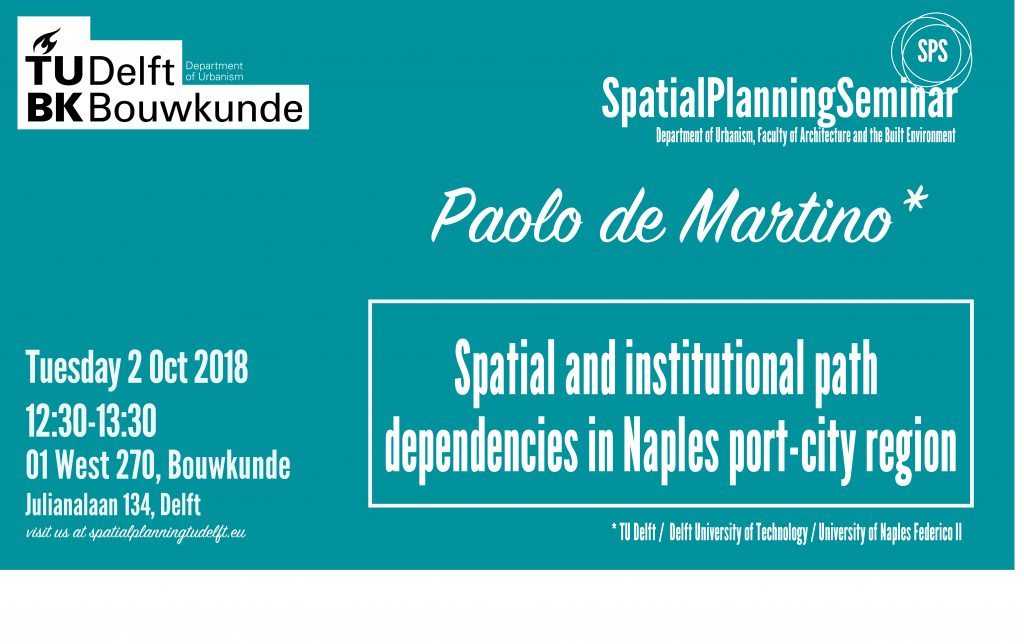Speaker: Paolo de Martino (Delft University of Technology/University of Naples Federico II)
Time and place: 02 October, 12:30, 01.West.270, BK, TU Delft
Topic: Defending the past by challenging the future. Analysis of spatial and institutional path dependencies in Naples port-city region  Today the port of Naples is experiencing a problem of relations with the city and the metropolitan area. This problem cannot be solved only by the port, but the port can become a solution. Historically in Naples port and city have been planned by a plurality of actors – state, port and city authorities, public agencies, and consortia – and therefore according to heterogeneous and disconnected visions and plans. This planning approach became a consolidated practice generating a rigid way of framing the port and city as separated elements. Therefore, the spatial and institutional conflict which still characterize the relation between port, city, and the surrounding regional territory in Naples are the result of specific path dependencies. Today, the emergence of a new metropolitan scale and the phenomena of port regionalization and cooperation at a European scale is challenging the spatial and institutional relation between ports, cities and regions responding to the fragmentation of the territory and the contemporary port-city planning. In the Italian case in 2016 a new national port reform reframed the theme of the ports in a new systemic logic at a more regional and national scale. In the specific case of Naples, the new port authority (Central Tyrrhenian Sea port system) includes the ports of Castellammare and Salerno. However, this new inclusive and collaborative perspective clashes with a plurality of actors, interests and spatial and institutional path dependencies that have historically hindered all forms of collaboration. In addition, European infrastructure policies just focus on infrastructure issues ignoring the presence, quite often, of fragile and degraded territories behind the ports. Therefore, the research put into question the traditional way of looking at just port and city relation. Rather it emphasizes the need for looking at the whole territory that relates to the port. Other European port cities are dealing with similar issues and conflicts. Therefore, by understanding how other European port and city authorities are going beyond path dependence can be a way to investigate how to plan a new form of integration between port and city in Naples evaluating the impacts of a port which is changing in scale dramatically. Going beyond path dependence will probably mean to completely rethink the relation between the infrastructure, the nature of the port, the systems of production and the fragile urban and metropolitan territories behind the ports.
Today the port of Naples is experiencing a problem of relations with the city and the metropolitan area. This problem cannot be solved only by the port, but the port can become a solution. Historically in Naples port and city have been planned by a plurality of actors – state, port and city authorities, public agencies, and consortia – and therefore according to heterogeneous and disconnected visions and plans. This planning approach became a consolidated practice generating a rigid way of framing the port and city as separated elements. Therefore, the spatial and institutional conflict which still characterize the relation between port, city, and the surrounding regional territory in Naples are the result of specific path dependencies. Today, the emergence of a new metropolitan scale and the phenomena of port regionalization and cooperation at a European scale is challenging the spatial and institutional relation between ports, cities and regions responding to the fragmentation of the territory and the contemporary port-city planning. In the Italian case in 2016 a new national port reform reframed the theme of the ports in a new systemic logic at a more regional and national scale. In the specific case of Naples, the new port authority (Central Tyrrhenian Sea port system) includes the ports of Castellammare and Salerno. However, this new inclusive and collaborative perspective clashes with a plurality of actors, interests and spatial and institutional path dependencies that have historically hindered all forms of collaboration. In addition, European infrastructure policies just focus on infrastructure issues ignoring the presence, quite often, of fragile and degraded territories behind the ports. Therefore, the research put into question the traditional way of looking at just port and city relation. Rather it emphasizes the need for looking at the whole territory that relates to the port. Other European port cities are dealing with similar issues and conflicts. Therefore, by understanding how other European port and city authorities are going beyond path dependence can be a way to investigate how to plan a new form of integration between port and city in Naples evaluating the impacts of a port which is changing in scale dramatically. Going beyond path dependence will probably mean to completely rethink the relation between the infrastructure, the nature of the port, the systems of production and the fragile urban and metropolitan territories behind the ports. 
Paolo De Martino is a third year PhD candidate. Since 2016 he is carrying out a research in a joint PhD program in Architecture and Urban Planning at the University of Technology of Delft (TUD) and at the University of Naples Federico II (Italy), working on a thesis entitled: “Port-city relations. Understanding Planning Agencies and Spatial Development at the Interface of the Port and City of Naples”. The research analyses port and city as spaces of actors with the aim, on one hand to understand how changing actor constellations impact both spatial relationships and representations of port and city and, on the other hand, to plan a new form of integration for the port-city interface. To do so, the research uses a mixed-method based on literature review and case study research with direct observations and interviews to people involved in port-city processes. Paolo is presenting, discussing, as well as writing for various International Conferences all over Europe.
